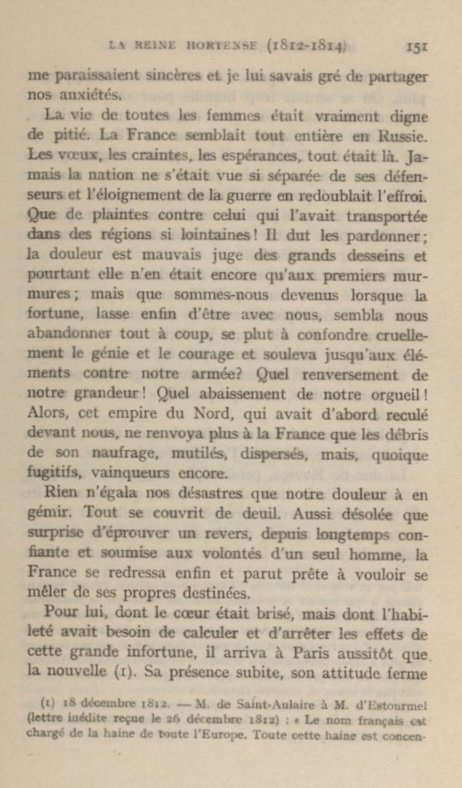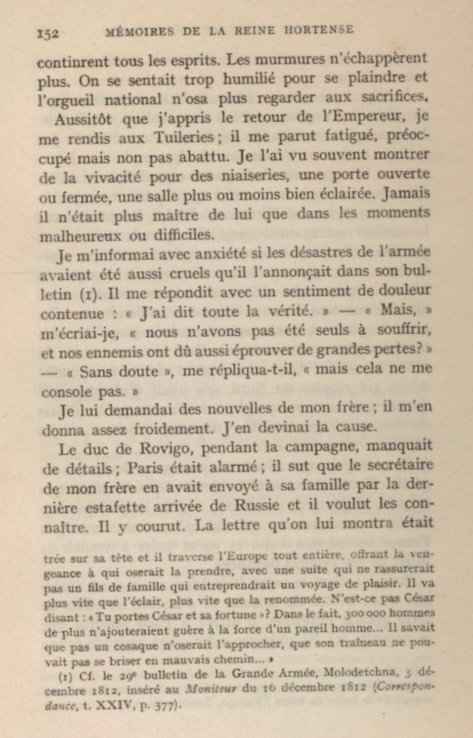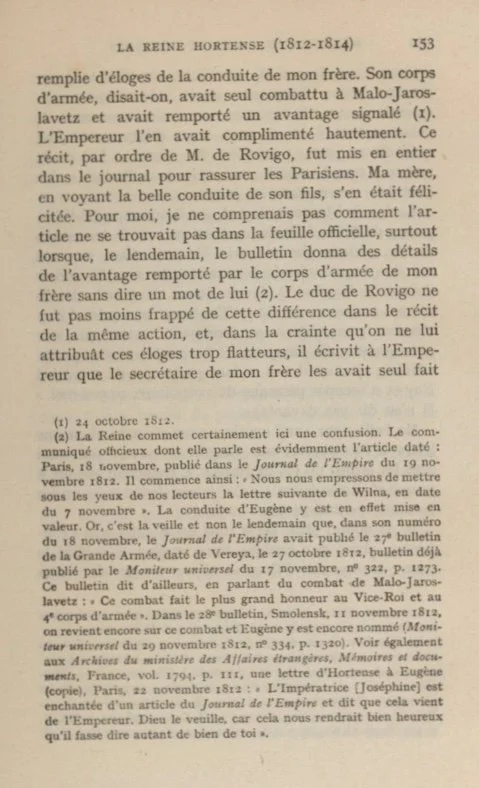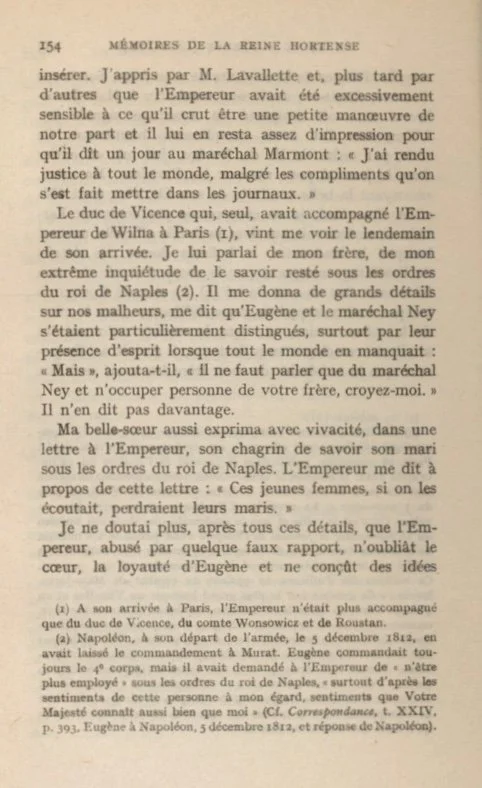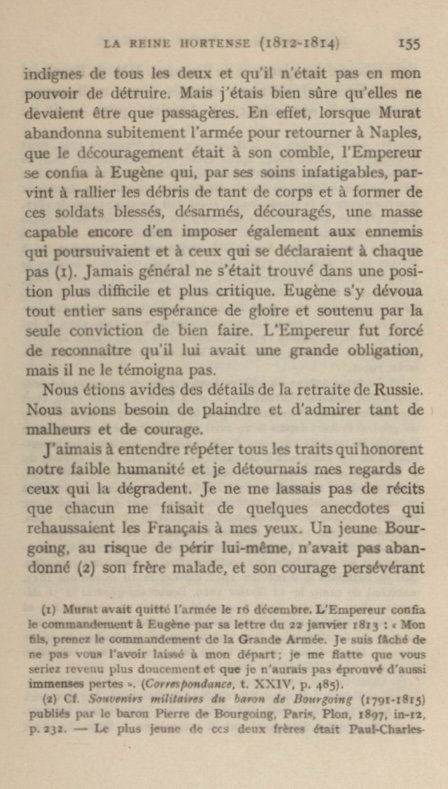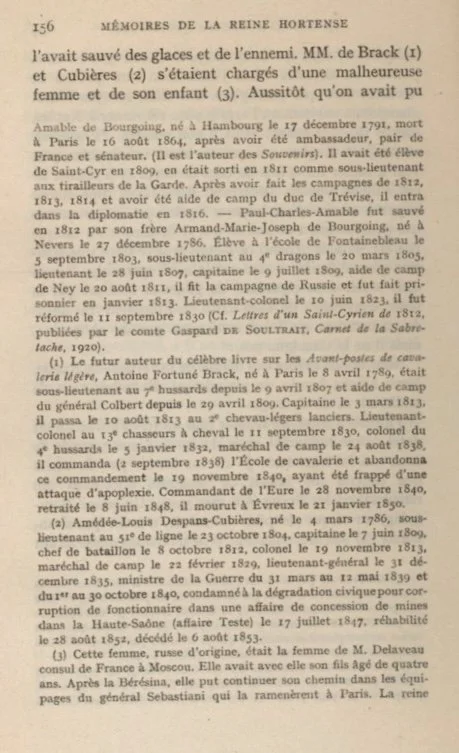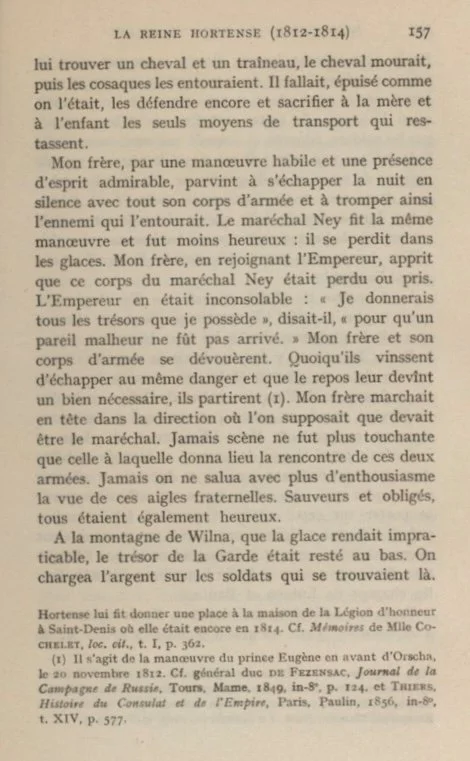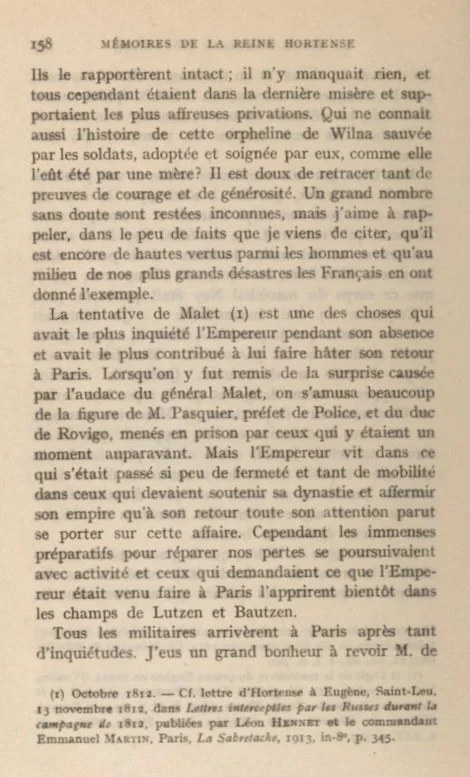Let’s have another look at Hortense’s Memoirs. If you want to read the book it is available for free at the side bar in English and French. Use the widget on the sidebar to translate the text below into pretty much any language.
Hortense describes how some hidden hand appeared to have successfully made Napoleon distrust her brother Eugene. She also recounts heroic stories from the war front.
Hortense’s memoirs continues:
The nation had never been so widely separated from its defenders. The distance at which war was being waged increased its terrors. There were many complaints against the man who had carried it so far afield.
He should have forgiven them. Sorrow is a bad counselor by which to judge of vast projects. As yet it only began to make itself heard, but the situation grew more serious the day when Fortune, weary of being always on our side, seemed suddenly to desert us, chose to set at naught both our skill and our courage and even raised the elemental forces of nature to combat our armies.
How completely our grandeur was overthrown! How our pride was humbled! On that day the Northern Empire, which had apparently retreated in confusion, turned on us.
Only a few broken, scattered fragments of France's great host came back—broken men, but heroes all. Our distress, our grief was as overwhelming as the disaster that had caused it. Everything was swathed in mourning. Equally dismayed and surprised at having met with defeat the French nation, which so long had allowed itself blindly to obey one man's commands, now arose and seemed ready to play a part in shaping its own destiny. As for that man, whose heart was broken, but whose genius was necessary to limit and combat the effects of the general disaster, he arrived in Paris almost as soon as the news of what had happened. His sudden appearance, his firm attitude kept people in order.
No more criticism was heard. Our humiliation was too great to express itself in complaints, and national pride forbade counting the cost of new sacrifices.
As soon as I heard of the Emperor's return I went to the Tuileries. He seemed to me wearied, worried, but not disheartened. I had often seen him lose his temper about some trifle such as a door opened when it should have been shut or vice versa, a room too brightly or too dimly lighted. But in times of difficulty or misfortune he was completely master of his nerves.
I inquired anxiously whether the disasters which had befallen the army had been as serious as his reports had stated. He replied with a tone of repressed emotion, "I told the entire truth."
“But," I exclaimed, "we were not the only ones to suffer. Our enemies must also have suffered very severe losses."
“That is certainly true," he answered, "but it does not console me." I asked for news of my brother, and he replied in rather a distant manner.
I easily guessed the reason for this attitude. During the campaign the Duc de Rovigo had lacked details of what was going on at the front. Paris was becoming uneasy. He heard that my brother's secretary had sent word to his family by a dispatch bearer who had just arrived from Russia, and he wished to know what news those letters contained.
He hastened to make inquiries. The letter that was shown him contained much praise of my brother's conduct. It mentioned among other things that his army corps had been the only one that offered any resistance at Maloyaroslavets, where it had met with considerable success.
The Emperor had warmly praised the attitude of these troops. The Duc de Rovigo gave orders to have an account of this action printed in full in the newspapers in order to reassure the Parisians. My mother, in reading how gallantly her son had behaved, had been much pleased, but I could not understand why the article did not appear in the official account of the battle, especially as the following day the Bulletin described the advantages won by my brother's army corps without mentioning his name.
The Duc de Rovigo was likewise struck by this difference between the two accounts of the same battle. Fearing that he would be accused of having himself been the author of these flattering remarks, he wrote the Emperor that it was my brother's secretary who was responsible for their appearing in print.
I heard from Monsieur de Lavallette that the Emperor was extremely vexed at what he considered a little trick on our part. Indeed, he was so annoyed that sometime later, speaking of it to Marshal Marmont, he said: "I gave everyone his just deserts in the way of praise, in spite of the compliments some people had printed about themselves in the newspapers."
The Duc de Vicence, who alone had accompanied the Emperor from Vilna to Paris, came to see me the day after his arrival. I spoke to him about my brother and how worried I was to have the latter serving under the King of Naples.
He gave me many details of the misfortunes which had befallen our forces and told me how greatly Eugene and Marshal Ney had distinguished themselves, especially by their presence of mind at a time when everybody was distraught.
“But," he added, "I earnestly advise you to talk only about what Marshal Ney did and not mention your brother."
He said nothing more on this subject. My sister-in-law in a letter to the Emperor also expressed her anxiety because her husband was serving under the King of Naples.
The Emperor speaking to me about this letter said, "These young wives, if people paid any attention to them, would ruin their husbands."
I did not doubt in view of all these incidents that the Emperor, believing some false report, distrusted the loyalty and attachment of Eugene and judged him in a way that was unworthy of both their characters, ideas which I was powerless to efface at once, although I was well aware that they would not last long. So it turned out, for when Murat suddenly abandoned the army to return to Naples and when the discouragement of the troops had reached its height the Emperor turned to Eugene.
The latter by his tireless activity managed to gather together the scattered fragments of the various units and form these wounded, badly equipped and dispirited men into an army which could still hold in check both the enemies which were pursuing them and the others which rose about them on every side.
Never had a general found himself in as critical and difficult a situation. Eugene devoted himself to his task without any thought of fame or honors but animated solely by a desire to do his duty. The Emperor was forced to recognize the fact that he was deeply indebted to my brother, but he never admitted it.
We were all of us anxious to obtain full details as to what had happened in Russia and we felt both sorrowful and proud on hearing these tales of disaster and heroism. I enjoyed anecdotes about incidents proving the nobility of human nature and was deaf to those which displayed it in an unfavorable light.
I never wearied of hearing about those episodes which increased my admiration for the soldiers of France.
For instance, there was the case of a young man named Bourgoing who at the risk of his own life had refused to abandon his brother, who was ill, and by his persistent courage had conquered the terrible assaults both of the climate and of the enemy.
Monsieur de Brack and Monsieur de Cubieres had undertaken to save a poor woman and her child. Scarcely had they secured a horse and a sleigh when the horse died, and they found themselves surrounded by Cossacks and obliged to continue to defend themselves in spite of their exhausted condition.
My brother, thanks to his presence of mind, performed a skillful maneuver and succeeded by taking advantage of the darkness in silently extricating his entire force from the hostile troops, who had completely surrounded him, thus frustrating them of their prey.
Marshal Ney attempted the same feat, but he was less fortunate. He lost his way in the snow-storm. My brother when he rejoined the Emperor heard that the Marshal's troops had probably either perished or been taken prisoners. The Emperor was inconsolable.
“I would have given all the wealth I possess to have avoided such a misfortune," he exclaimed. My brother and his soldiers undertook to save the situation.
Although they had just escaped from those same dangers and were in the greatest need of rest, they set out. My brother led the way in the direction in which he supposed the Marshal to be.
Never was there a more touching scene than that when the two armies met. Never was the sight of the imperial eagles under which they had both fought received with more enthusiasm. Rescuers and rescued were equally overjoyed.
On the mountain of Vilna, which the ice rendered impassable, it was necessary to leave the treasure-chests of the Guard behind. The silver was entrusted to the soldiers who happened to be there at the time.
All brought it back intact, not a penny was missing, and yet all of them were utterly destitute and undergoing the most terrible privations. There was also the well-known story of the little orphan girl of Vilna whose life the soldiers saved and whom they adopted and cared for as tenderly as a mother might have done. It is pleasant to recall all these instances of courage and self-sacrifice. Many others doubtless will never be known, but I am glad to be able to remind people by the few incidents just mentioned that in our day men still know how to perform deeds of courage and abnegation, and that in the midst of our most serious misfortunes, Frenchmen have always displayed these sterling qualities.
The original French is available below:


